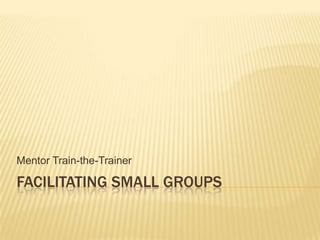
Facilitating Small Groups
- 1. Facilitating Small Groups Mentor Train-the-Trainer
- 2. Course Goal This course provides participants with the knowledge and skills necessary to effectively facilitate small group sessions
- 3. Course objectives Participants will be able to: Explain the various stages of group development Identify the characteristics of adult learning Explain the difference between training and facilitation Describe small group facilitation skills and use them during teach-back activities Understand the need to ensure cultural competency when facilitating a group
- 4. GROUPS
- 5. Group Process Cooperation Coordination Common Procedures Mutual Support
- 6. The lifecycle of groups The Stages of Group Development Group Development Characteristics Acquaintance Groundwork Working Closure Interpersonal Issues Group Behavioral Patterns Group Task/Issues Leadership Issues
- 7. The lifecycle of groups Acquaintance Orientation Groundwork Organization Working Cohesiveness Closure Separation and re-entry
- 8. Acquaintance stage Interpersonal Issues Inclusion Group/Behavioral Patterns Identity Group Task/Issues Dependence Leadership Issues Commitment
- 9. Groundwork stage Interpersonal Issues Control Group/Behavioral Patterns Norm Setting Group Task/Issues Decision Making Process Leadership Issues Counter-Dependence
- 10. Working stage Interpersonal Issues Affection Group/Behavioral Patterns Negotiation/Cohesion Group Task/Issues Functional Relationships Leadership Issues Interdependence
- 11. Closure stage Interpersonal Issues Separation Group/Behavioral Patterns Growth and Insight Group Task/Issues Application & Productivity Leadership Issues Independence
- 12. ADULT LEARNING
- 13. Childhood vs adult learning Major Differences Learners Role Motivation for Learning Choice of Content Method of Focus
- 14. Adult learning occurs best when… It is self-directed Fills an immediate need Is participatory in nature Provides feedback Shows respect for learner Occurs in a comfortable environment
- 15. The Learning process Knowledge “I know” Skills “I can” Attitudes “I will” Competence “I show” Performance “I do”
- 16. FACILITATION
- 17. tRAINING To Coach or accustom a mode of behavior To provide knowledge of; instruct in To carry on instruction on a regular basis
- 18. Facilitation The act of making easier Increasing the likelihood or effectiveness of a behavior or a response
- 19. Training vs facilitation-what happens? Training Facilitation You tell and show You talk You have the knowledge You have the experience Requires more preparation Participants work it out Participants talk You both have the knowledge You both have the experience Requires less preparation
- 21. FACILITATION ACTIVITIES pRESENTATION demonstration Conveys information Lecture/ Q & A Useful for large groups Conveys lots of material in a short time Provides an overview Teaches a specific skill Models a step by step approach Easy to focus participants attention Requires planning Not useful in large groups
- 22. FACILITATION ACTIVITIES Case Study Role play Written description of a situation Participants can relate to study Participant are involved Use of analysis and discussion Not always one right solution Two or more individuals act out scenario Helps to challenge attitudes Spontaneous Enables participants to explore alternative scenarios and approaches
- 23. FACILITATION ACTIVITIES Simulation Small Group Discussion Enactment of real-life situation Participants are able to discover and react High level of involvement Applies knowledge, develops skills Enhances problem-solving skills Participants learn from each other Clarifies personal values Participation encouraged Promotes teamwork
- 25. The Facilitator role Attending Clarifying Supporting Informing Probing Motivating Evaluation Problem Solving
- 26. The Facilitators Role Attending clarifying Reflect before responding Use brief responses Use phrases, terms familiar to participants Be spontaneous Perception checking Clarification of alternatives Request for further information
- 27. The Facilitators Role supporting probing Involves actively providing feedback Communicates feelings of security Acknowledgement of persons feelings Facilitators attempt to gain more information Used to guide the discussion Open-ended questions Exploratory in nature
- 28. Managing a challenging group Distracted Participant Expert Joker Late Arriver/Early Leaver Nay-sayer Quiet One Side-Bar Talker
- 29. Managing a challenging group Interrupter Corrector Long-Winded Grouch Prisoner
- 30. The meaning and use of silence Attending Listening Shows support Opportunity for participants to talk Use as a method to probe Fatigue
- 31. Cultural Competency Group differences Culture Ethnicity Value diversity Self-Assessment Cultural Knowledge Cultural Awareness Cultural Sensitivity
- 32. Six basic guidelines to remember! Introduce the purpose Talk about yourself and your qualifications Provide an overview or agenda Establish ground rules Explain anticipated outcome Build trust and respect with the group